19 june 2019

Qatari envoy Mohamed al-Emadi has said his country’s new cash aid will be doled out to 60,000 poor families in the Gaza Strip as of Thursday morning.
Each family will receive a stipend of $100 from post offices across Gaza, according to the previous mechanism.
Emadi said Sunday that 100,000 needy families would receive the payouts, but on Wednesday he stated that post offices would only hand out $100 bills to 60,000 poor families.
He also said that the funds Qatar initially allocated for the remaining 40,000 families, $4 million, would instead go to “executing other sustainable projects which will be announced in the future.”
Each family will receive a stipend of $100 from post offices across Gaza, according to the previous mechanism.
Emadi said Sunday that 100,000 needy families would receive the payouts, but on Wednesday he stated that post offices would only hand out $100 bills to 60,000 poor families.
He also said that the funds Qatar initially allocated for the remaining 40,000 families, $4 million, would instead go to “executing other sustainable projects which will be announced in the future.”
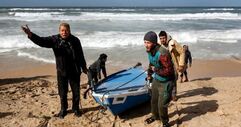
Palestinian fishermen incur daily losses amounting to more than half a million shekels (about $140,000) as a result of Israel’s current naval closure on the Gaza Strip, according to Nizar Ayyash, chief of the fishermen’s union.
Ayyash told Quds Press that Israel’s naval closure, which started six days ago, on Gaza deprived 4,000 fishermen of their sole source of livelihood and made them join the ranks of the unemployed.
He condemned the Israeli naval closure as “mass punishment” against 4,000 fishermen supporting about 50,000 people in Gaza.
On June 12, the Israeli occupation army imposed a complete fishing ban in Gaza waters, claiming the measure was in response to the launch of inflaming balloons at Israeli areas.
Ayyash told Quds Press that Israel’s naval closure, which started six days ago, on Gaza deprived 4,000 fishermen of their sole source of livelihood and made them join the ranks of the unemployed.
He condemned the Israeli naval closure as “mass punishment” against 4,000 fishermen supporting about 50,000 people in Gaza.
On June 12, the Israeli occupation army imposed a complete fishing ban in Gaza waters, claiming the measure was in response to the launch of inflaming balloons at Israeli areas.
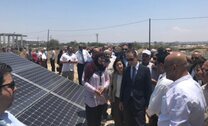
Inaugurating the Photo Voltaic Solar System for the Rafah Wastewater Treatment and Reuse Plants project. (Credit: UNDP)
The United Nations Development Programme (UNDP) and the government of Japan, in partnership with the Palestinian Ministry of Agriculture, Palestinian Energy and Natural Resources Authority (PENRA) and the Costal Municipalities Water Utility have inaugurated the Photo Voltaic Solar System, for the Rafah Wastewater Treatment and Reuse Plants project.
The project, worth $500,000, will provide more than 170,000 Palestinians, including farmers, in Gaza, with improved access to water, sanitation and hygiene services. This will be done through the provision of 200 KWp of sustainable electricity supply that will allow the Rafah Wastewater Treatment and Reuse plants to treat the wastewater for irrigation and pump the treated water into farming areas.
Takeshi Okubo, Ambassador for Palestinian Affairs and Representative of Japan to Palestine, expressed his gratitude to all partners for making the project successful including UNDP and the Palestinian counterpart.
“For the past decade, the Gaza Strip has suffered from a chronic electricity deficit as well as severe waste water problems, which undermined fragile living conditions.
Therefore, Japan provided an additional grant of $500,000 to UNDP with the aim of providing a renewable energy source as a sustainable solution to the current energy crisis which would ensure the optimal operation of the Rafah WWTP,” he said.
“Japan is committed to supporting humanitarian aspect as well as long term development plans in Gaza as a friend in need and we hope this project will alleviate the suffering of people in Gaza,” he added, according to WAFA.
According to the United Nations “Gaza in 2020: A liveable Place?” report, some 90,000 CM of raw or partially treated sewage is being discharged, daily, into the Mediterranean Sea (almost 33 MCM per year). This is causing pollution and creating public health hazards.
UNDP Head of Office in Gaza, Chitose Noguchi, said: “Energy is a critical enabler for people to live a safe, healthy and productive life. Yet, the Gaza strip has been suffering from a chronic electricity deficit since 2006.
Thanks to the Government of Japan, we have installed a renewable energy system that will improve public health and environment conditions. The 7000 CM of the treated water will be pumped to irrigate farming areas, benefiting almost 500 farmers and their families”.
The ceremony took place yesterday, at the Rafah Wastewater Treatment and Reuse Plants, and was attended by Takeshi Okubo, Chitose Noguchi, and Monther Shublaq, General Director of Coastal Municipalities Water Utility.
The United Nations Development Programme (UNDP) and the government of Japan, in partnership with the Palestinian Ministry of Agriculture, Palestinian Energy and Natural Resources Authority (PENRA) and the Costal Municipalities Water Utility have inaugurated the Photo Voltaic Solar System, for the Rafah Wastewater Treatment and Reuse Plants project.
The project, worth $500,000, will provide more than 170,000 Palestinians, including farmers, in Gaza, with improved access to water, sanitation and hygiene services. This will be done through the provision of 200 KWp of sustainable electricity supply that will allow the Rafah Wastewater Treatment and Reuse plants to treat the wastewater for irrigation and pump the treated water into farming areas.
Takeshi Okubo, Ambassador for Palestinian Affairs and Representative of Japan to Palestine, expressed his gratitude to all partners for making the project successful including UNDP and the Palestinian counterpart.
“For the past decade, the Gaza Strip has suffered from a chronic electricity deficit as well as severe waste water problems, which undermined fragile living conditions.
Therefore, Japan provided an additional grant of $500,000 to UNDP with the aim of providing a renewable energy source as a sustainable solution to the current energy crisis which would ensure the optimal operation of the Rafah WWTP,” he said.
“Japan is committed to supporting humanitarian aspect as well as long term development plans in Gaza as a friend in need and we hope this project will alleviate the suffering of people in Gaza,” he added, according to WAFA.
According to the United Nations “Gaza in 2020: A liveable Place?” report, some 90,000 CM of raw or partially treated sewage is being discharged, daily, into the Mediterranean Sea (almost 33 MCM per year). This is causing pollution and creating public health hazards.
UNDP Head of Office in Gaza, Chitose Noguchi, said: “Energy is a critical enabler for people to live a safe, healthy and productive life. Yet, the Gaza strip has been suffering from a chronic electricity deficit since 2006.
Thanks to the Government of Japan, we have installed a renewable energy system that will improve public health and environment conditions. The 7000 CM of the treated water will be pumped to irrigate farming areas, benefiting almost 500 farmers and their families”.
The ceremony took place yesterday, at the Rafah Wastewater Treatment and Reuse Plants, and was attended by Takeshi Okubo, Chitose Noguchi, and Monther Shublaq, General Director of Coastal Municipalities Water Utility.
18 june 2019
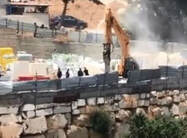
Israeli soldiers invaded, Tuesday, Jabal al-Mokabber neighborhood, southeast of occupied East Jerusalem, and demolished a hardware store, under the pretext of being unlicensed.
The soldiers surrounded the entire neighborhood before invading it, and prevented the Palestinians from entering or leaving it.
Local sources said dozens of soldiers surrounded and isolated the area before invading it, accompanied by bulldozers, and demolished the property.
On Tuesday morning, the army demolished a two-story residential building of four units, in Shu’fat refugee camp, in the center of Jerusalem.
On Monday at night, the soldiers demolished a two-story residential building in Silwan town, south of the Al-Aqsa Mosque, in Jerusalem.
The soldiers surrounded the entire neighborhood before invading it, and prevented the Palestinians from entering or leaving it.
Local sources said dozens of soldiers surrounded and isolated the area before invading it, accompanied by bulldozers, and demolished the property.
On Tuesday morning, the army demolished a two-story residential building of four units, in Shu’fat refugee camp, in the center of Jerusalem.
On Monday at night, the soldiers demolished a two-story residential building in Silwan town, south of the Al-Aqsa Mosque, in Jerusalem.
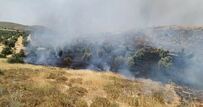
A horde of Jewish settlers on Monday set fire to cultivated lands in the villages of Beitin and Burqa, east of Ramallah in the occupied West Bank.
The arson attack led to the destruction of about 30 olive and fig trees and grapevines as well as other crops in the villages.
According to local sources, a number of local residents were able to rush to the burning area and embarked on extinguishing the flames until civil defense crews arrived and controlled the fires.
The targeted lands are located near the illegal settlement of Givat Assaf, and the Israeli occupation army prevents local farmers from going to their lands there without prior coordination.
The arson attack led to the destruction of about 30 olive and fig trees and grapevines as well as other crops in the villages.
According to local sources, a number of local residents were able to rush to the burning area and embarked on extinguishing the flames until civil defense crews arrived and controlled the fires.
The targeted lands are located near the illegal settlement of Givat Assaf, and the Israeli occupation army prevents local farmers from going to their lands there without prior coordination.
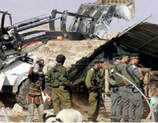
Israeli soldiers invaded, Tuesday, the village of Qosra, southeast of the northern West Bank city of Nablus, demolished an agricultural shed, and uprooted several olive trees.
Resident Mousa Ahmad Hasan told the WAFA Palestinian News Agency that the soldiers invaded the Shu’ab al-Khasab area, and demolished an agricultural of 42 square/meters.
He added that the soldiers also uprooted many olive trees in the same area, before withdrawing.
It is worth mentioning that this is the second time the army demolishes this room since November of 2018, and the family managed to rebuild it with funding from international relief groups.
Resident Mousa Ahmad Hasan told the WAFA Palestinian News Agency that the soldiers invaded the Shu’ab al-Khasab area, and demolished an agricultural of 42 square/meters.
He added that the soldiers also uprooted many olive trees in the same area, before withdrawing.
It is worth mentioning that this is the second time the army demolishes this room since November of 2018, and the family managed to rebuild it with funding from international relief groups.
17 june 2019
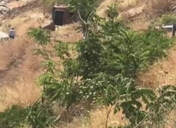
Israeli soldiers uprooted, Monday, dozens of Palestinian olive trees in the western area of the al-‘Isawiya town, south of the Al-Aqsa Mosque in occupied East Jerusalem, reportedly “obscuring the view of surveillance cameras in the area.” video
Mohammad Abu al-Hummus, a member of the Follow-Up Committee in al-‘Isawiya said the soldiers invaded the town since morning hours, and were extensively deployed in various roads and neighborhoods.
He added that Israeli police officers also ticketed several Palestinian cars, and searched them, in addition to examining the ID cards of many Palestinians.
Abu al-Hummus also said the uprooting of the trees was made under false pretenses, especially since it came shortly after the army distributed demolition and eviction orders of Palestinian property, as part of the so-called “National Gardens.”
Mohammad Abu al-Hummus, a member of the Follow-Up Committee in al-‘Isawiya said the soldiers invaded the town since morning hours, and were extensively deployed in various roads and neighborhoods.
He added that Israeli police officers also ticketed several Palestinian cars, and searched them, in addition to examining the ID cards of many Palestinians.
Abu al-Hummus also said the uprooting of the trees was made under false pretenses, especially since it came shortly after the army distributed demolition and eviction orders of Palestinian property, as part of the so-called “National Gardens.”
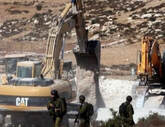
Israeli soldiers invaded, earlier Monday, Masafer Yatta area, east of Yatta town, south of the southern West Bank city of Hebron, and destroyed four residential sheds, and solar panels.
Rateb Jabour, the coordinator of the National and Popular Committee against the Annexation Wall and Colonies in southern West Bank, said the soldiers invaded Khallet ad-Dabe’ area in al-Masafer ash-Sharqiya, and demolished four residential sheds.
The sheds, built with tin and bricks, housed ten members of the family of Mohammad Ali Jaber Dababsa.
The soldiers also destroyed solar panels, which were used to provide electricity to the Palestinians.
The army frequently targets the Palestinians in the area, including the demolition of homes, tents and property, in addition to causing damage to structures, agricultural lands, wells and water networks.
Rateb Jabour, the coordinator of the National and Popular Committee against the Annexation Wall and Colonies in southern West Bank, said the soldiers invaded Khallet ad-Dabe’ area in al-Masafer ash-Sharqiya, and demolished four residential sheds.
The sheds, built with tin and bricks, housed ten members of the family of Mohammad Ali Jaber Dababsa.
The soldiers also destroyed solar panels, which were used to provide electricity to the Palestinians.
The army frequently targets the Palestinians in the area, including the demolition of homes, tents and property, in addition to causing damage to structures, agricultural lands, wells and water networks.
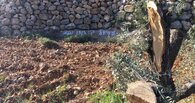
Israeli settlers on Sunday chopped off dozens of Palestinian-owned olive trees in Bani Na'im town, east of al-Khalil city.
Anti-settlement activist Rateb al-Jabour said that groups of Israeli settlers uprooted olive trees planted in Palestinian lands that were seized by the Israeli authorities last month in Bani Na'im town.
The Israeli occupation authorities last month handed Palestinian citizens notices informing them that 4,800 dunums of their lands in Bani Na'im would be seized.
Al-Jabour said the residents were told to stop any kind of work they were undertaking on these lands and that they have 45 days to object to this order starting 25 May.
He explained that Israel wants to use the targeted lands to expand the Jewish settlement of Bani Haifer which was illegally built on Palestinian land southeast of Bani Na'im.
Anti-settlement activist Rateb al-Jabour said that groups of Israeli settlers uprooted olive trees planted in Palestinian lands that were seized by the Israeli authorities last month in Bani Na'im town.
The Israeli occupation authorities last month handed Palestinian citizens notices informing them that 4,800 dunums of their lands in Bani Na'im would be seized.
Al-Jabour said the residents were told to stop any kind of work they were undertaking on these lands and that they have 45 days to object to this order starting 25 May.
He explained that Israel wants to use the targeted lands to expand the Jewish settlement of Bani Haifer which was illegally built on Palestinian land southeast of Bani Na'im.
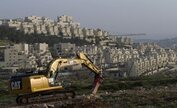
The plot to destroy 2000 fully mature olive trees near the city of Bethlehem, in southern West Bank, was rubber-stamped by the Israeli occupation authorities, according to WAFA News Agency.
The 2000 trees, extend over a 1600 meter long road connecting two Palestinian villages, Taqou’ town and al-Minya, and take up 80 dunums of land, belonging to Palestinians.
Local activist Hasan Brijiyeh, an anti-settlement, anti-wall activist told WAFA that the Israeli regime has intensified it’s arrest of the youth, theft of land, and road closures in the area.
Article 49 of the 4th Geneva Convention of 1949 states that the occupying force is forbidden from transferring members of its own population onto the land that it occupied.
Israel occupied Palestine in 1948, and regularly demolishes Palestinian homes to make room for Jewish-only settlements across the West Bank.
Today, about 600,000 illegal Israeli settlers reside in the occupied Palestinian Territories, in defiance of International Law.
The 2000 trees, extend over a 1600 meter long road connecting two Palestinian villages, Taqou’ town and al-Minya, and take up 80 dunums of land, belonging to Palestinians.
Local activist Hasan Brijiyeh, an anti-settlement, anti-wall activist told WAFA that the Israeli regime has intensified it’s arrest of the youth, theft of land, and road closures in the area.
Article 49 of the 4th Geneva Convention of 1949 states that the occupying force is forbidden from transferring members of its own population onto the land that it occupied.
Israel occupied Palestine in 1948, and regularly demolishes Palestinian homes to make room for Jewish-only settlements across the West Bank.
Today, about 600,000 illegal Israeli settlers reside in the occupied Palestinian Territories, in defiance of International Law.
15 june 2019
|
|
Israeli forces on Saturday assaulted a Palestinian young man in his workplace in the 1948 occupied Palestinian territories.
Local sources said that Dawood Gharbiya, a resident of Jenin, suffered bruises and fractures after being attacked by Israeli soldiers. They added that the Israeli forces detained Gharbiya under the pretext that he did not have a work permit and violently beat him before he was released hours later. |
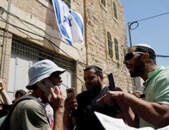
Several illegal Israeli colonialist settlers invaded and occupied, Saturday, a store owned by the Palestinian Ministry of Waqf and Religious Affairs, near the Old Vegetables Market in the Old City of Hebron, in the southern part of the occupied West Bank.
The head of the Hebron Construction Committee, Lawyer Tawfiq Jahshan, told the WAFA Palestinian News Agency that the store, owned by the Waqf Ministry, is rented to Abu Khaled Abu Aisha, and is located behind the Al-Aqtaab Mosque.
He added that the store is also near the illegal Avraham Avino colony, which was installed on private Palestinian lands and property.
After storming the store, the colonists changed its locks, and started altering its appearance.
Representing Abu Aisha, Jahshan stated that he tried to file a complaint with the Israeli Police, but they kept coming up with excuses, and added that he will file complaints with Israeli courts and follow-up on the matter using all available legal options.
The head of the Hebron Construction Committee, Lawyer Tawfiq Jahshan, told the WAFA Palestinian News Agency that the store, owned by the Waqf Ministry, is rented to Abu Khaled Abu Aisha, and is located behind the Al-Aqtaab Mosque.
He added that the store is also near the illegal Avraham Avino colony, which was installed on private Palestinian lands and property.
After storming the store, the colonists changed its locks, and started altering its appearance.
Representing Abu Aisha, Jahshan stated that he tried to file a complaint with the Israeli Police, but they kept coming up with excuses, and added that he will file complaints with Israeli courts and follow-up on the matter using all available legal options.
14 june 2019
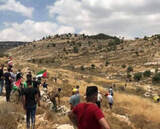
Israeli soldiers attacked, Friday, a weekly procession in Azmout village, east of the northern West Bank city of Nablus, causing many Palestinians to suffer the severe effects of teargas inhalation.
Ghassan Daghlas, a Palestinian official who monitors Israel’s illegal colonialist activities in northern West Bank, said the residents marched to their lands to protest the Israeli decision to illegally annex 20 Dunams of Palestinian orchards and farmlands located in Azmout and Deir al-Hatab villages.
He added that the army confiscated the Palestinian lands to pave a new military road, and to annex them to the illegal Elon Moreh colony.
During the procession, the soldiers fired a barrage of gas bombs and concussion grenades, causing many to suffer the effects of teargas inhalation, in addition to causing fire in surrounding lands.
Ghassan Daghlas, a Palestinian official who monitors Israel’s illegal colonialist activities in northern West Bank, said the residents marched to their lands to protest the Israeli decision to illegally annex 20 Dunams of Palestinian orchards and farmlands located in Azmout and Deir al-Hatab villages.
He added that the army confiscated the Palestinian lands to pave a new military road, and to annex them to the illegal Elon Moreh colony.
During the procession, the soldiers fired a barrage of gas bombs and concussion grenades, causing many to suffer the effects of teargas inhalation, in addition to causing fire in surrounding lands.
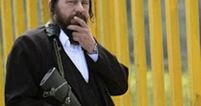
An armed Jewish settler physically assaulted a Palestinian farmer and his son in an area in Ramallah on Thursday.
According to local sources, an armed settler from the illegal Halamish settlement physically assaulted 15-year-old Rami al-Tamimi and his father (crippled) as they were gathering sagebrush and thyme (herbs) in an area in Ramallah.
The settler also brought cows and let them graze on Palestinian-owned lands.
According to local sources, an armed settler from the illegal Halamish settlement physically assaulted 15-year-old Rami al-Tamimi and his father (crippled) as they were gathering sagebrush and thyme (herbs) in an area in Ramallah.
The settler also brought cows and let them graze on Palestinian-owned lands.
13 june 2019
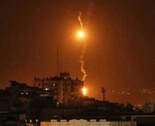
Israeli soldiers fired, on Thursday at dawn, several missiles into Palestinian lands in Gaza city, and Rafah in the southern part of the coastal region, causing damage to nearby homes and buildings.
Media sources said the Israeli missiles did not lead to casualties, but caused damage to some homes and structures near the targeted areas.
They added that the soldiers also fired two artillery shells into farmlands, east of Khan Rafah, causing damage,
Israel also ordered Gaza coastal waters shut until further notice, preventing the residents, including the fishermen, from entering Palestinian waters, “in response to flammable balloons and kites flown from Gaza into nearby Israeli area.”
The Israeli army said a shell was fired from Gaza, during late night hours Wednesday, before the Iron Dome missile interception system managed to detonate it.
Media sources said the Israeli missiles did not lead to casualties, but caused damage to some homes and structures near the targeted areas.
They added that the soldiers also fired two artillery shells into farmlands, east of Khan Rafah, causing damage,
Israel also ordered Gaza coastal waters shut until further notice, preventing the residents, including the fishermen, from entering Palestinian waters, “in response to flammable balloons and kites flown from Gaza into nearby Israeli area.”
The Israeli army said a shell was fired from Gaza, during late night hours Wednesday, before the Iron Dome missile interception system managed to detonate it.
Page: 25 - 24 - 23 - 22 - 21 - 20 - 19 - 18 - 17 - 16 - 15 - 14 - 13 - 12 - 11 - 10 - 9 - 8 - 7 - 6 - 5 - 4
